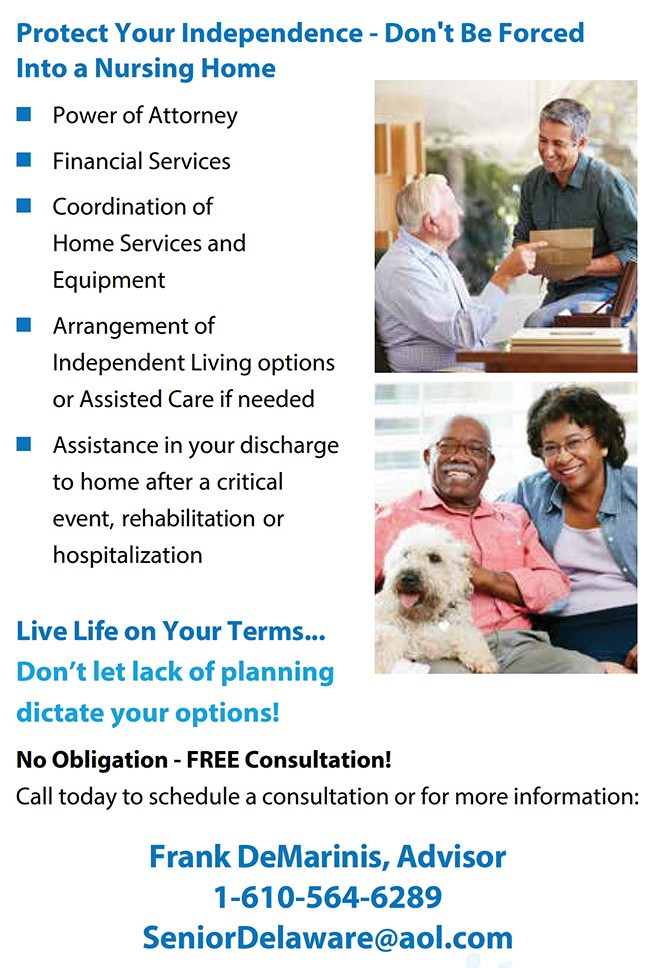Smart Senior Planning For Future Health
 By Frank Demarinis
By Frank Demarinis
As seniors approach later stages in life, it’s important to consider living arrangements and long-term care options. Preparing for the possibility of needing assisted living is a crucial step that can make the transition smoother and more manageable. Here are several key tips to help seniors prepare for assisted living prior to needing it.
1. Evaluate current living arrangements
One of the first steps is to assess current living conditions. Seniors should take stock of their homes, evaluating their ability to maintain a safe and comfortable environment. This might involve discussing potential hazards and challenges they face. Are stairs becoming difficult to navigate? Are essential services like grocery stores and medical facilities easily accessible? Identifying these issues early on allows for timely solutions, such as modifying the home or considering alternative residence options. We will often arrange an “emergency list” of pre-approved providers (home care, desired rehabilitation center if ever needed, etc.) to be prepared for a medical event should one arise.
2. Explore different assisted living options
Seniors should begin researching various assisted living facilities to understand what’s available in their area. Different communities offer varying levels of care and amenities. Some might focus more on independent living with support, while others provide extensive medical care. By visiting different facilities, seniors can get a sense of the environment, assess staff interaction, and understand the lifestyle and activities offered. Creating a list of preferred facilities can help when the time comes to make a decision. Again, being proactive versus reactive is key. There is little time for shopping or careful thought once an emergent change occurs.
3. Financial planning
Preparing financially for assisted living is one of the most critical aspects. Seniors should evaluate their financial situation, including income, savings, and long-term care insurance. Understanding costs associated and potential out-of-pocket expenses can help seniors and their families to create a realistic budget. Consulting with a financial planner who specializes in elder care can also provide insights into making the most of available resources. Setting up trusts 5 years before necessity is a good rule of thumb. Being proactive in establishing financially protected vessels and trustee can be beneficial in later Medicaid qualification if ever needed.
4. Legal and medical preparations
Another important area seniors need to address is their legal and medical affairs. Creating or updating documents like a living will, power of attorney, and advanced healthcare directives ensures that their wishes are known and respected. Additionally, keeping a current list of medications, medical conditions, and preferred doctors can facilitate smoother transitions to assisted living.
5. Communication with family and friends
Open dialogue with family members about the potential need for assisted living is essential. Conversations should focus on preferences, concerns, and expectations regarding care and living arrangements. This proactive approach helps family members understand their loved one’s wishes and provides an opportunity to discuss options and support systems. It may also ease feelings of anxiety or reluctance about the transition, making the process feel less daunting.
6. Consider personal preferences and lifestyle
Assisted living is not just about care; it’s also about quality of life. Seniors should reflect on their lifestyle preferences and what they value most—be it social activities, gardening, or fitness programs. When visiting facilities, paying attention to these aspects can be very telling. Engaging with communities that offer preferred activities and social environments contributes to overall well-being.
7. Trial living arrangements
If feasible, seniors might consider short-term stays in assisted living facilities. This arrangement allows them to experience the community firsthand and assess its suitability without the pressure of an immediate commitment. Many facilities offer respite care, enabling seniors to spend a temporary period in a supportive environment while still in their own homes.
Preparing for assisted living doesn’t mean admitting defeat; rather, it is about having a plan that prioritizes safety, comfort, and independence. By evaluating living arrangements, exploring options, planning financially and legally, engaging in open communication, considering personal preferences, and building a support network, seniors can set themselves up for a positive transition when the time comes. Careful preparation and proactive decisions can significantly enhance quality of life in the later years.
Healthcare and financial POA (Power of Attorney) assignment includes enrollment into the Emergency Notification System (ENS) for a small monthly payment. For those 85+, living alone at risk for hospitalization may obtain services through our grant program free of charge. Grant approval is not necessarily income based. Showing a strong need of risk and desire to maintain independently in one’s own home meets most of our grant funding requirement(s).
If you or anyone you know can benefit from taking advantage of this opportunity to plan for the unexpected, please contact us and we would be happy to help you.
For more information, call 1-800-564-0173 visit our website www.AdvancedDirective.info or email [email protected].
1-800-564-0173


